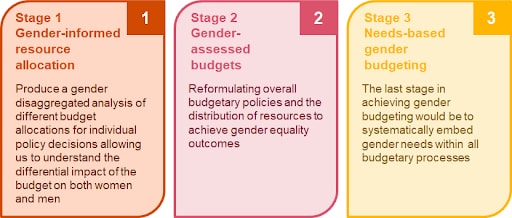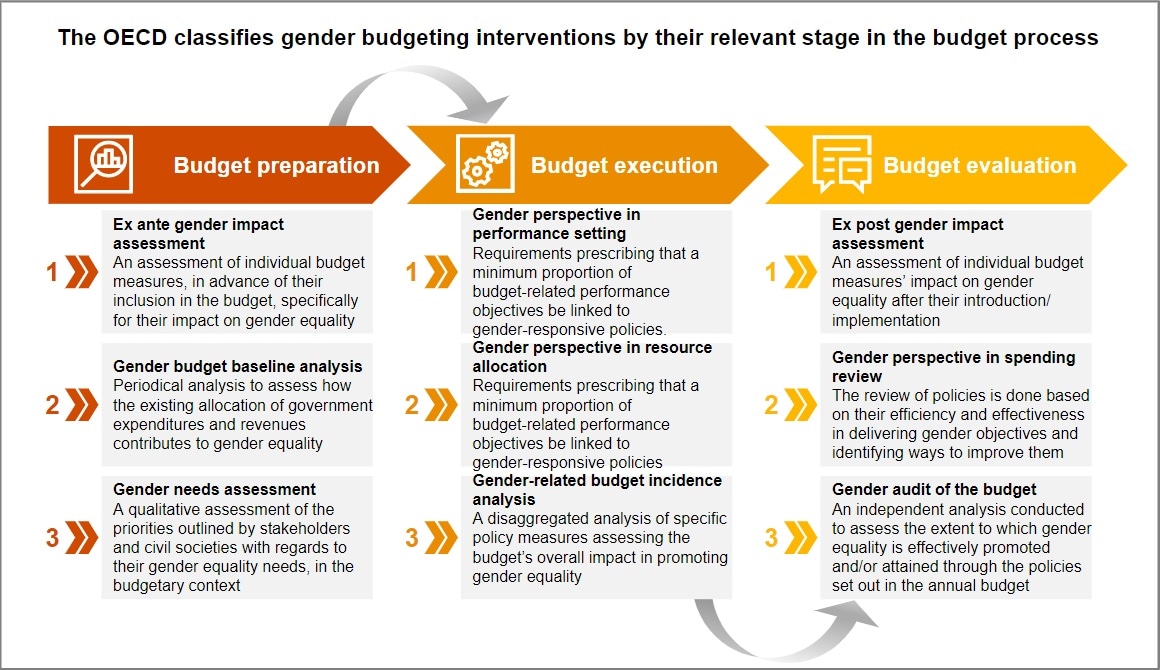Gender budgeting: Rethinking the Budgetary Process in the Gulf
28 September, 2020
By: Yasmina Hamdan, Frank C. Bracco
Gender budgeting has taken on increased importance and visibility this year as part of the Group of 20 (G20) session in Saudi Arabia. In this month’s Economy Matters blog serves as a primer on the topic of gender budgeting and how it could support the social and fiscal agendas of governments in the region.
The United Nations (UN) and its partner organizations have encouraged countries to strive for gender equality. This commitment to gender equality has taken on increased importance through its inclusion in the UN Sustainable Development Goals.1 Many countries are making progress in achieving gender equality, but work remains in the Gulf region.2 Focus has historically been on improving legal rights and closing the workforce participation gap3, but this year’s Group of 20 (G20) session in Saudi Arabia has emphasized an additional tool that policymakers should consider: gender (or gender-sensitive) budgeting.
What is gender budgeting?
According to the IMF, “gender budgeting is an approach to budgeting that uses fiscal policy and administration to promote gender equality...and women’s development.”4 The Council of Europe furthers this definition by stating that, “gender budgeting [incorporates] a gender perspective at all levels of the budgetary process [by] restructuring revenues and expenditures.”5
Gender budgeting can:
- Accelerate the Gulf’s - and the broader Middle East’s - gender equality efforts across many policy areas by raising awareness and understanding gender issues.
- Contribute to the efficiency and effectiveness of government programs by (1) designing programs targeted equally to both men and women, and (2) identifying key outcomes or goals that would then flow through the planning, allocation, and distribution of public funds.
- Increase participation and transparency in the budget process by (1) offering participatory budgeting opportunities and (2) reinforcing the importance of data collection for existing monitoring and evaluation processes.
- Offer opportunities to strengthen the governance and accountability of gender equality issues as gender budgeting processes become embedded in policy-making at the national, sub-national, and municipal levels through a process (budgeting) that all entities in government are exposed to.
Gender budgeting does not call for a new budget process, but rather for a “gender mainstreaming” approach into all stages of the budget cycle and policy-making. Three incremental categories exist for adopting gender budgeting:6

Gender budgeting tools in the three different stages of the budget process6

Gender budgeting in the global context
Australia became the first country to adopt gender budgeting in 1984.6 Since then, more than half of the OECD countries have introduced, or plan to introduce, gender budgeting initiatives.6 Many OECD countries’ commitment to gender budgeting can be seen articulated in the European Union’s European Consensus on Development (2017) and Gender Action Plan II 2016-2020 which work to promote gender mainstreaming practices in social, fiscal, and economic policy-making.
In the MENA region, Morocco became the first country to engage in gender budgeting in 20026 followed by efforts seen in Egypt (2005) and Bahrain (2010).7 Morocco serves as an example of how a country could implement gender budgeting: first it assessed the social needs of women (e.g. education, health, employment); then, the government amended the budget law in 2014 to require gender perspective setting and objectives to be included as part of budget formulation efforts.
Morocco’s gender budgeting journey 7,8

Through applying a gender needs assessment, Morocco’s education sector saw an increase in school enrolment for children aged 6 to 11 from 79.1% in 2000 to 93% in 2005; for young girls in rural areas it went up by 18 percentage points in the same period.7
Egypt’s efforts started with a budget circular requiring the assessment of the service needs of men and women then implemented gender responsive-performance budgeting during the 2010/2011 fiscal year. More recently, Bahrain has invested in building capacity in the government for the adoption of gender budgeting.9
An opportunity for Gulf countries
The existing fiscal challenges facing Gulf countries means that budgetary processes across the region will be under scrutiny and subject to reform. By ensuring budgetary reforms include gender budgeting, governments can optimize their budgetary allocations by:
- Decreasing social development/benefits/grants expenditures in the long-term (accounting ~35-40% of total FY20 budget across the GCC)10
- Refocusing spending efforts and stimulus packages towards activities that boost private sector growth (e.g. entrepreneurship, technology adoption, innovation)
- Supporting revenue diversification efforts due to increased consumption as a result of higher wages and increased contributions to economic activity by female-driven spending
Reimagining budgetary processes to encourage the inclusivity of women could also support the economy as well by:
- Improving productivity
- Boosting economic growth
- Reducing the deficit gap and strengthening sovereign credit ratings positions
Implementing gender budgeting will also require governments in the region to grapple with some difficult questions, including:
- How does a country institutionalize gender budgeting - particularly in times of fiscal consolidation? One example could be UAE’s efforts in establishing the Gender Balance Council in 2015, a federal entity responsible for developing and implementing the federal gender balance agenda. The entity is working with the Ministry of Finance towards the implementation of gender budgeting.11
- How might the region balance historical cultural norms with gender budgeting objectives? Adopting gender budgeting may run counter to existing cultural norms and current legal jurisprudence; reform campaigns may be needed elsewhere to ensure the full benefits of gender budgeting can be recognised.
- What might capacity development look like for finance functions? Gender budgeting relies heavily on evidence-based policy development processes that have policy appraisal and policy evaluation embedded within them. Emerging economies often are still developing their capabilities in these areas, which could delay or hinder recognising the full benefit of gender budgeting.
- Who should solve the data availability issues to help inform policy making? New data collection and measurement techniques will likely be needed but these may be difficult to deploy in countries that are still developing their government statistical data-gathering functions and capabilities.
How countries choose to address these challenges to implement gender budgeting will vary based on the individual country context, but all Gulf countries can benefit from starting to consider a gender perspective in resource allocation and performance setting. Saudi Arabia’s role as host of the G20 further brings a focus on gender equality issues and can help lead to frameworks and processes that can better support the Gulf and other emerging economies as they work to fully recognise the benefit of gender budgeting.
1) United Nations, Sustainable Development Goal #5: Gender Equality.
2) PwC, “Women In Work Index 2019”, March 2019.
3) PwC, “Opportunities for Economic Growth through Female Labour Force Participation in KSA”, March 2019.
4) IMF, “Gender Budgeting: Fiscal Context and Current Outcomes”, July 2016.
5) Council of Europe, “Gender Budgeting”, 2005.
6) OECD, Gender Budgeting in OECD countries, 2017.
7) UNICEF, Gender responsive Budgets in Morocco: illustration of the Paris Declaration Alignment and Ownership principles, 2007
8) UN Women, Morocco's successful case in implementing gender responsive budgets, 2014
9) IMF, “Middle East and Central Asia:A Survey of Gender Budgeting Efforts”, July 2016.
10) The Ministry of Finance’s Budget Statement for the UAE, KSA, Oman, Bahrain, Kuwait, Qatar
11) Gender Balance Council, UAE







